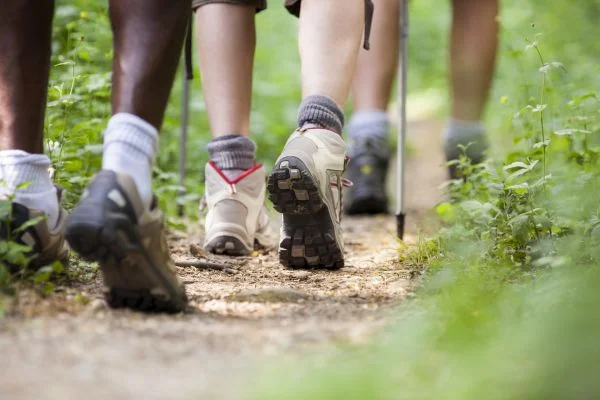Have you ever wondered whether it’s better to wear hiking shoes for a long walk or regular sneakers? Trying to figure out which shoes are best for what activity cannot be very clear, but it doesn’t have to be! So let’s look at Are Hiking Shoes Good For Walking and when they should or shouldn’t be used.
Discover the versatility of hiking shoes beyond the trails in our updated 2024 guide. Explore whether hiking shoes are suitable for walking and unlock insights for your outdoor adventures.
What Are Hiking Shoes?
Hiking shoes are purpose-built footwear designed to meet the demands of outdoor enthusiasts who traverse rugged terrains, from steep mountains to dense forests. With features tailored to provide stability, protection, and comfort, hiking shoes are essential gear for any outdoor adventure.

Features of Hiking Shoes
Hiking shoes feature a distinctive design optimized for performance on varied terrain. Understanding the key components of hiking shoes can help hikers choose the right pair for their adventures:
- Thicker Soles: Hiking shoes are equipped with thicker soles compared to regular walking shoes. These soles provide enhanced stability and cushioning, protecting the feet from impact and rough terrain.
- Durable Upper Materials: The upper part of hiking shoes is crafted from durable materials such as leather, synthetic fabrics, or a combination of both. These materials offer protection against abrasions, water, and debris encountered on the trail.
- Toe Protection: Many hiking shoes feature reinforced toe caps or bumpers to shield the toes from accidental impacts with rocks or roots, reducing the risk of injury.
- Ankle Support: Unlike low-cut trail running shoes, hiking shoes often have a higher cut that provides additional ankle support. This design feature helps stabilize the ankle joint and reduce the risk of sprains when navigating uneven terrain.
Benefits of Hiking Shoes
Hiking shoes offer several advantages over regular footwear, making them indispensable for outdoor enthusiasts:
- Stability: The thicker soles and supportive design of hiking shoes provide stability on uneven surfaces, reducing the risk of slips and falls.
- Protection: The durable materials and toe protection features of hiking shoes shield the feet from potential hazards such as rocks, roots, and thorny vegetation.
- Comfort: Hiking shoes are engineered for comfort during long hours on the trail, with features like cushioned midsoles and breathable linings that help reduce fatigue and discomfort.
- Versatility: Hiking shoes are versatile enough to handle a wide range of outdoor activities, from day hikes to multi-day backpacking trips, making them a practical choice for outdoor enthusiasts.
Choosing the Right Hiking Shoes
Selecting the appropriate hiking shoes is essential for a comfortable and enjoyable outdoor experience. Consider the following factors when choosing hiking shoes:
- Terrain: Determine the type of terrain you’ll be hiking on most frequently, whether it’s rocky mountain trails, muddy forest paths, or desert sands. Choose hiking shoes with features suited to the terrain you’ll encounter.
- Fit: Proper fit is crucial for hiking shoes to provide optimal support and comfort. Ensure there’s enough room in the toe box to prevent blisters and discomfort, and consider trying on different sizes and widths to find the perfect fit.
- Waterproofing: If you’ll be hiking in wet conditions or crossing streams, opt for hiking shoes with waterproof membranes to keep your feet dry and comfortable.
- Breathability: In hot and humid environments, breathable hiking shoes with mesh panels or moisture-wicking linings help keep your feet cool and dry.
Hiking shoes are essential gear for outdoor enthusiasts seeking adventure in rugged terrain. With their specialized design features, including thicker soles, durable materials, and ankle support, hiking shoes provide the stability, protection, and comfort needed for a successful hike. By understanding the anatomy of hiking shoes and considering factors such as terrain, fit, waterproofing, and breathability, hikers can choose the right footwear to enhance their outdoor experience and tackle any trail with confidence.
Also Read: Can You Wear Hiking Shoes Every Day?
Are Hiking Shoes Good For Walking?

Hiking shoes have a few key features that make them ideal for walking. The most important of these features is the sole of the shoe. This shoe part is to provide support and stability on uneven terrain and cushioning to reduce shock. This makes hiking shoes much more comfortable than regular sneakers when walking on uneven surfaces such as gravel, dirt roads, and trails.
Hiking shoes also tend to have higher ankle support than regular sneakers. This is beneficial if you plan on taking long walks and will be putting extra strain on your ankles due to the amount of stress placed on them when walking up hills or downhill slopes. In addition, the higher ankle support helps prevent any strain from occurring in the first place.
Also Read: How Long Do Hiking Shoes Last?
When Not To Use Hiking Shoes For Walking
There are some instances where it is not ideal for wearing hiking shoes for walking. If you plan short walks around town or want something comfortable and lightweight while running errands, wearing regular sneakers might be a better option than hiking shoes.

This is because they will not provide as much cushioning or support as their heavier counterparts and may even cause pain if worn too long without proper cushioning insole inserts.
Also Read: Are Hiking Shoes Good For Walking?
Are Hiking Boots Better Than Walking Shoes?
When it comes to enjoying a good old-fashioned hike, it’s a pressing question whether to wear walking shoes or hiking boots. While a lot of this may come down to personal preference, there are online few different key factors that set the two apart.
Hiking boots offer more support than walking shoes, as they’re with an eye toward climbing hills or over rougher terrain. This can be a significant advantage when traversing rocks or dodging roots on the trail. For those planning long hikes, the right pair of boots could make all the difference in comfort – meaning fewer hot spots and blisters at day’s end.
However, for city-dwellers who prefer flatter ground, walking shoes may be sufficient for enjoying nature without bogging down by extra weight or ankle stiffness by heavier soles. So after considering your needs, take some time to find your perfect fit – it could be the difference between an exhausting tour and an enjoyable experience!
Also Read: How Should Hiking Shoes Fit?
Conclusion:
So, Are Hiking Shoes Good For Walking? It’s clear that there are many benefits to wearing hiking shoes while walking, but only if you need that level of cushioning and support provided by this type of shoe. If you don’t require those features, then your regular sneakers should do just fine on shorter walks or errands around town!
Knowing when it’s best to use each type of shoe can help ensure that you get the most out of your walk every time – so put those hiking shoes away until you need them!



